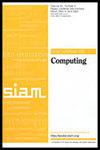Adversarial Laws of Large Numbers and Optimal Regret in Online Classification
IF 1.6
3区 计算机科学
Q3 COMPUTER SCIENCE, THEORY & METHODS
引用次数: 2
Abstract
Laws of large numbers guarantee that given a large enough sample from some population, the measure of any fixed subpopulation is well-estimated by its frequency in the sample. We study laws of large numbers in sampling processes that can affect the environment they are acting upon and interact with it. Specifically, we consider the sequential sampling model proposed by [O. Ben-Eliezer and E. Yogev, The adversarial robustness of sampling, in Proceedings of the 39th ACM SIGMOD-SIGACT-SIGAI Symposium on Principles of Database Systems (PODS), 2020, pp. 49–62] and characterize the classes which admit a uniform law of large numbers in this model: these are exactly the classes that are online learnable. Our characterization may be interpreted as an online analogue to the equivalence between learnability and uniform convergence in statistical (PAC) learning. The sample-complexity bounds we obtain are tight for many parameter regimes, and as an application, we determine the optimal regret bounds in online learning, stated in terms of Littlestone’s dimension, thus resolving the main open question from [S. Ben-David, D. Pál, and S. Shalev-Shwartz, Agnostic online learning, in Proceedings of the 22nd Conference on Learning Theory (COLT), 2009], which was also posed by [A. Rakhlin, K. Sridharan, and A. Tewari, J. Mach. Learn. Res., 16 (2015), pp. 155–186].在线分类中的大数对抗律与最优后悔
大数定律保证,给定来自某个群体的足够大的样本,任何固定子群体的测量都可以通过样本中的频率得到很好的估计。我们研究采样过程中的大数定律,这些定律可以影响它们所作用的环境并与之相互作用。具体来说,我们考虑了由[O。Ben-Eliezer和E. Yogev,《抽样的对抗性稳稳性》,发表于第39届ACM SIGMOD-SIGACT-SIGAI数据库系统原理研讨会(PODS), 2020年,第49-62页),并描述了在该模型中承认大数统一定律的类:这些正是在线可学习的类。我们的表征可以被解释为统计(PAC)学习中可学习性和均匀收敛之间等价的在线模拟。我们获得的样本复杂度界限对于许多参数体系都是严格的,并且作为一个应用,我们确定了在线学习中的最优后悔界限,用Littlestone维表示,从而解决了[S]中的主要开放问题。Ben-David, D. Pál, S. shalov - shwartz,不可知论在线学习,第22届学习理论会议论文集(COLT), 2009)。Rakhlin, K. Sridharan和A. Tewari, J. Mach。学习。Res., 16 (2015), pp. 155-186]。
本文章由计算机程序翻译,如有差异,请以英文原文为准。
求助全文
约1分钟内获得全文
求助全文
来源期刊

SIAM Journal on Computing
工程技术-计算机:理论方法
CiteScore
4.60
自引率
0.00%
发文量
68
审稿时长
6-12 weeks
期刊介绍:
The SIAM Journal on Computing aims to provide coverage of the most significant work going on in the mathematical and formal aspects of computer science and nonnumerical computing. Submissions must be clearly written and make a significant technical contribution. Topics include but are not limited to analysis and design of algorithms, algorithmic game theory, data structures, computational complexity, computational algebra, computational aspects of combinatorics and graph theory, computational biology, computational geometry, computational robotics, the mathematical aspects of programming languages, artificial intelligence, computational learning, databases, information retrieval, cryptography, networks, distributed computing, parallel algorithms, and computer architecture.
 求助内容:
求助内容: 应助结果提醒方式:
应助结果提醒方式:


